 There appear to be two kinds of conflict: the one initiated by an individual and the one initiated by a group. There also appears to be a natural cycle to conflict – the individual acting on behalf of a group gains power and can become so disconnected from reality that they are later removed from power by the evolving group. So, both autocracy and democracy appear to have a light-side and a dark-side: with the benefit leading the risk. The problem is that this system design creates the necessary and sufficient conditions for oscillating behaviour: boom-to-bust; centralise-to-decentralise; expand-to-contract. It it not a true cycle though because time cannot be reversed, we can never go back to a previous time – so what we see as oscillating is more like a driver swerving from one side of the road to another when the road ahead is not straight and the forward view is limited. To progress quickly along a winding road at night we need early warning of the next bend, good lights, quick reflexes, and a responsive engine, brakes and steering. We need quick and accurate feedback and the confidence to decide and act. The less feedback we get the more bumps we have, the lower our confidence falls, and the slower our progress becomes until we are paralysed with anxiety and fear. Asking for feedback is relatively easy – giving feedback is much more difficult because to be effective it must be tailored to the recipient. General and anonymous feedback is ineffective. This implies that the person who asks for feedback must also specify why they want it and how they want it – they need to set out the terms of the psychological contract. Without that clarity we descend into confusion. Conflict is often seen as unhealthy and destructive and when conflict is manifest as as battle the out-of-date paradigm that is blocking progress is destroyed but the collateral damage is the price that is paid. Innocent bystanders get caught in the crossfire. It is this fear of collateral damage that often paralyses action and hands power to the autocrat. The good news is that conflict can be healthy and constructive – when it is manifest as a race for understanding, for meaning and for a common purpose. As a race and a challenge and with vision, agility and energy the unknown winding road ahead can be transformed into a safe and exhilarating ride!
There appear to be two kinds of conflict: the one initiated by an individual and the one initiated by a group. There also appears to be a natural cycle to conflict – the individual acting on behalf of a group gains power and can become so disconnected from reality that they are later removed from power by the evolving group. So, both autocracy and democracy appear to have a light-side and a dark-side: with the benefit leading the risk. The problem is that this system design creates the necessary and sufficient conditions for oscillating behaviour: boom-to-bust; centralise-to-decentralise; expand-to-contract. It it not a true cycle though because time cannot be reversed, we can never go back to a previous time – so what we see as oscillating is more like a driver swerving from one side of the road to another when the road ahead is not straight and the forward view is limited. To progress quickly along a winding road at night we need early warning of the next bend, good lights, quick reflexes, and a responsive engine, brakes and steering. We need quick and accurate feedback and the confidence to decide and act. The less feedback we get the more bumps we have, the lower our confidence falls, and the slower our progress becomes until we are paralysed with anxiety and fear. Asking for feedback is relatively easy – giving feedback is much more difficult because to be effective it must be tailored to the recipient. General and anonymous feedback is ineffective. This implies that the person who asks for feedback must also specify why they want it and how they want it – they need to set out the terms of the psychological contract. Without that clarity we descend into confusion. Conflict is often seen as unhealthy and destructive and when conflict is manifest as as battle the out-of-date paradigm that is blocking progress is destroyed but the collateral damage is the price that is paid. Innocent bystanders get caught in the crossfire. It is this fear of collateral damage that often paralyses action and hands power to the autocrat. The good news is that conflict can be healthy and constructive – when it is manifest as a race for understanding, for meaning and for a common purpose. As a race and a challenge and with vision, agility and energy the unknown winding road ahead can be transformed into a safe and exhilarating ride!
Do You Have A Miserable Job?
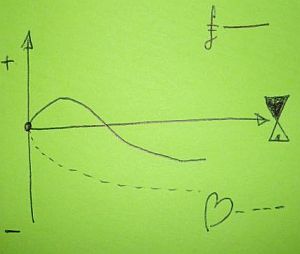 If you feel miserable at work and do not know what to do then then take heart because you could be suffering from a treatable organisational disease called CRAP (cynically resistant arrogant pessimism).
If you feel miserable at work and do not know what to do then then take heart because you could be suffering from a treatable organisational disease called CRAP (cynically resistant arrogant pessimism).
To achieve a healthier work-life then it is useful to understand the root cause of CRAP and the rationale of how to diagnose and treat it.
Organisations have three interdependent dimensions of performance: value, time and money. All organisations require both the people and the processes to be working in synergy to reliably deliver value-for-money over time. To create a productive system it is necessary to understand the relationships between value, money and time. Money is easier because it is tangible and durable; value is harder because it is intangible and transient. This means that the focus of attention is usually on the money – and it is often assumed that if the money is OK then the value must be OK too. This assumption is incorrect.
Value and money are interdependent but have different “rates of change” and can operate in different “directions”. A common example is when a dip in financial performance triggers an urgent “drive” to improve the “bottom line”. Reactive revenue generation and cost cutting results in a small, quick, and tangible improvement on the money dimension but at the same time sets off a large, slow, and intangible deterioration on the value dimension. Money, time and value are interdependent and the inevitable outcome is a later and larger deterioration in the money – as illustrated in the doodle. If only money is measured the deteriorating value is not detected, and by the time the money starts to falter the momentum of the falling value is so great that even heroic efforts to recover are futile. As the money starts to fall the value falls even further and even faster – the lose-lose-lose spiral of organisational failure is now underway.
People who demonstrate in their attitude and behaviour that they are miserable at work provide the cardinal sign of falling system value. A miserable, sceptical and cynical employee poisons the emotional atmosphere for everyone around them. Misery is both defective and infective. The primary cause of a miserable job is the behaviour exhibited by people in positions of authority – and the more the focus is only on money the more misery their behaviour generates.
Fortunately there is an antidote; a way to break out of the vicious tail spin – measure both value and money, focus on improving value and observe the positive effect on the money. The critical behaviour is to actively test the emotional temperature and to take action to keep it moving in a positive direction. “The Three Signs of a Miserable Job” by Patrick Lencioni tells a story of how an experienced executive learns that the three things a successful managerial leader must do to achieve system health are:
1) ensure employees know their unique place, role and value in the whole system;
2) ensure employees can consciously connect their work with a worthwhile system goal; and
3) ensure employees can objectively measure how they are doing.
Miserable jobs are those where the people feel anonymous, where people feel their work is valueless, and where people feel that they get no feedback from their seniors, peers or juniors. And it does not matter if it is the cleaner or the chief executive – everyone needs a role, a goal and to know all their interdependencies.
We do not have to endure a Miserable Job – we all have the power to transform it into Worthwhile Work.
In Whom and in What do We Trust?
 The issue of trust has been a recurring theme again this week – and it has appeared in many guises. In one situation it was a case of distrust – I observed an overt display of suspicious, sceptical, and cynical behaviour. In another situation it was a case of mistrust – a misplaced confidence in my own intuition. My illogical and irrational heart said one thing but when my mind worked through the problem logically and rationally my intuition was proved incorrect. In another it was a case of rewarded-trust: positive feedback that showed a respectful challenge had resulted in a win-win-win outcome. And in yet another a case of extended-trust: an expression of delighted surprise from someone whose default position was to distrust.
The issue of trust has been a recurring theme again this week – and it has appeared in many guises. In one situation it was a case of distrust – I observed an overt display of suspicious, sceptical, and cynical behaviour. In another situation it was a case of mistrust – a misplaced confidence in my own intuition. My illogical and irrational heart said one thing but when my mind worked through the problem logically and rationally my intuition was proved incorrect. In another it was a case of rewarded-trust: positive feedback that showed a respectful challenge had resulted in a win-win-win outcome. And in yet another a case of extended-trust: an expression of delighted surprise from someone whose default position was to distrust.
Improvement Science rests on two Foundation stones Trust and Capability. First to trust oneself to have the confidence and humility to challenge, to learn, to change, to improve, to celebrate and to share; second to extend trust to others with a clear explanation of the consequences of betraying that trust; and third in building collective trust by having the courage to challenge trust-eroding behaviour.
At heart we are all curious, friendly, social animals – our natural desire is to want to trust. Distrust is a learned behaviour that, ironically, is the result of the instinctive trust and respect that, as children, we have for our parents. We are taught to distrust by observing and copying distrustful and disrepectful behaviour by our role models. So with this insight we gain access to an antidote to the emotional poison of distrust: our innate child-like curiosity, desire to explore, appetite for fun, and thirst for knowledge and meaning. To dissolve distrust we only need to reconnect to our own inner child: One half of the foundation of Improvement Science.
Deming’s “System of Profound Knowledge”
W. Edwards Deming (1900-1993) is sometimes referred to as the Father of Quality. He made such a significant contribution to Japan’s burgeoning post-war reputation for innovative high-quality products, and the rapid development of their economic power, that he is regarded as having made more of a difference than any other individual not of Japanese heritage.
Though best known as a statistician and economist, he was initially educated as an electrical engineer and mathematical physicist. To me however he was more of a social scientist – interested in the science of improvement and the creation of value for customers. A lifelong learner, in his later years (1) he became fascinated by epistemology – the processes by which knowledge is created – and this led him into wanting to know more about the psychology of human behaviour and its underlying motivations.
In his nineties he put his whole life of learning into one model – his System of Profound Knowledge (SoPK). What follows is my brief take on each of the four elements of the SoPK and how they fit together.
THE PSYCHOLOGY OF HUMAN BEHAVIOUR
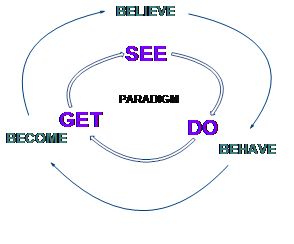 Everyone is different, and we all SEE things differently. We then DO things based on how we see things – and we GET results – of some kind. Over time we shore up our own particular view of the world – some call this a “paradigm” – our own particular world view – multiple loops of DO-GET-SEE (2) are self-reinforcing and as our sense making becomes increasingly fixed we BEHAVE – BECOME – BELIEVE. The trouble is we each to some extent get divorced from reality, or at least how most others see it – in extreme cases we might even get classified by some people as “insane” – indeed the clinical definition of insanity is doing the same things whilst expecting different results.
Everyone is different, and we all SEE things differently. We then DO things based on how we see things – and we GET results – of some kind. Over time we shore up our own particular view of the world – some call this a “paradigm” – our own particular world view – multiple loops of DO-GET-SEE (2) are self-reinforcing and as our sense making becomes increasingly fixed we BEHAVE – BECOME – BELIEVE. The trouble is we each to some extent get divorced from reality, or at least how most others see it – in extreme cases we might even get classified by some people as “insane” – indeed the clinical definition of insanity is doing the same things whilst expecting different results.
THE ACQUISITION OF KNOWLEDGE
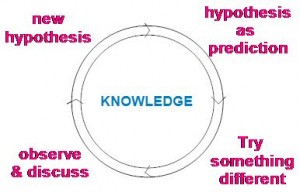 So when we DO things it would be helpful if we could do them as little experiments that test our sense of what works and what is real. Even better we might get others to help us interpret the results from the benefit of their particular world view/ paradigm. Did you study science at school? If so you might recognize that learning in this way by experimentation is the “scientific method” in action. Through these cycles of learning knowledge gets continually refined and builds. It is also where improvement comes from and how reality evolves. Deming referred to this as the PLAN-DO-STUDY-ACT Cycle (1) – personally i prefer the words in this adjacent diagram. For me the cycle is as much about good mental health as acquiring knowledge, because effective learning (3) keeps individuals and organizations connected to reality and in control of their lives.
So when we DO things it would be helpful if we could do them as little experiments that test our sense of what works and what is real. Even better we might get others to help us interpret the results from the benefit of their particular world view/ paradigm. Did you study science at school? If so you might recognize that learning in this way by experimentation is the “scientific method” in action. Through these cycles of learning knowledge gets continually refined and builds. It is also where improvement comes from and how reality evolves. Deming referred to this as the PLAN-DO-STUDY-ACT Cycle (1) – personally i prefer the words in this adjacent diagram. For me the cycle is as much about good mental health as acquiring knowledge, because effective learning (3) keeps individuals and organizations connected to reality and in control of their lives.
UNDERSTANDING VARIATION
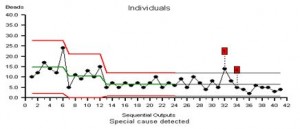 The origins of PDSA lie with Walter Shewhart (4) who in 1925 – invented it to help people in organizations methodically and continually inquire into what is happening. He observed that when workers or managers make changes in their working practices so that their processes run better, the results vary, and that this variation often fools them. So he invented a tool for collecting numbers in real time so that each process can be listened in to as a “system” – much like a doctor uses a stethoscope to collect data and interpret how their patient’s system is behaving, by asking what might be contributing to – actually causing – the system’s outcomes. Shewhart named the tool Statistical Process Control – three words, each of which for many people are an instant turn-off. This means they miss his critical insight that there are two distinct types of variation – noise and signal, and that whilst all systems contain noise, only some contain signals – which if present can be taken to be assignable causes of systemic behaviour. Indeed to make it more palatable the tool might better be referred to as a “system behaviour chart”. It is meant to be interpreted like a doctor or nurse interprets the vital sign graph on the end of a patient’s bed i.e. to decide what action if any to take and when. Here is an example that has been created in BaseLine© which is specifically designed to offer the agnostic direct access to the power of Shewhart’s thinking. (5).
The origins of PDSA lie with Walter Shewhart (4) who in 1925 – invented it to help people in organizations methodically and continually inquire into what is happening. He observed that when workers or managers make changes in their working practices so that their processes run better, the results vary, and that this variation often fools them. So he invented a tool for collecting numbers in real time so that each process can be listened in to as a “system” – much like a doctor uses a stethoscope to collect data and interpret how their patient’s system is behaving, by asking what might be contributing to – actually causing – the system’s outcomes. Shewhart named the tool Statistical Process Control – three words, each of which for many people are an instant turn-off. This means they miss his critical insight that there are two distinct types of variation – noise and signal, and that whilst all systems contain noise, only some contain signals – which if present can be taken to be assignable causes of systemic behaviour. Indeed to make it more palatable the tool might better be referred to as a “system behaviour chart”. It is meant to be interpreted like a doctor or nurse interprets the vital sign graph on the end of a patient’s bed i.e. to decide what action if any to take and when. Here is an example that has been created in BaseLine© which is specifically designed to offer the agnostic direct access to the power of Shewhart’s thinking. (5).
THINKING SYSTEMICALLY
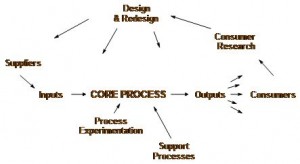 What is meant by the word “system”? It means all the parts connected and interrelated as a whole (3). It is often helpful to get representatives of the various stakeholder groups to map the system – with its parts, the flows and the connections – so they can see how different people make sense of say.. their family system, their work system, a particular process of interest.. indeed any system of any kind that feels important to them. The map shown here is one used that might be used generically by manufacturers to help them investigate the separate causal sources of systemic variation – from the Suppliers of Inputs received, to the Processes that convert those inputs into Outputs, which can then be received by Customers – all made possible by vital support processes. This map (1) was taught by Deming in 1950 to Japan’s leaders. When making sense of their own particular systemic context others may prefer a different kind of map, but why? How come others prefer to make sense of things in their own way? To answer this Peter Senge (3) in his own equivalent to the SoPK says you need 5 distinct disciplines: the ability to think systemically, to learn as a team, to create a shared vision, to understand how our mental models get ingrained, and lastly “personal mastery” … which takes me back to where I started.
What is meant by the word “system”? It means all the parts connected and interrelated as a whole (3). It is often helpful to get representatives of the various stakeholder groups to map the system – with its parts, the flows and the connections – so they can see how different people make sense of say.. their family system, their work system, a particular process of interest.. indeed any system of any kind that feels important to them. The map shown here is one used that might be used generically by manufacturers to help them investigate the separate causal sources of systemic variation – from the Suppliers of Inputs received, to the Processes that convert those inputs into Outputs, which can then be received by Customers – all made possible by vital support processes. This map (1) was taught by Deming in 1950 to Japan’s leaders. When making sense of their own particular systemic context others may prefer a different kind of map, but why? How come others prefer to make sense of things in their own way? To answer this Peter Senge (3) in his own equivalent to the SoPK says you need 5 distinct disciplines: the ability to think systemically, to learn as a team, to create a shared vision, to understand how our mental models get ingrained, and lastly “personal mastery” … which takes me back to where I started.
Aware that he was at the end of his life of learning, Deming bequeathed his System of Profound Knowledge to us so that we might continue his work. Personally, I love the SoPK because it is so complete. It is hard however to keep such a model, complete and as a whole, continually in the front of our minds – such that everything we think and do can be viewed as a fractal of that elegant whole. Indeed as a system, the system of profound knowledge is seriously – even fatally – undermined if any single part is missing ..
• Without understanding the causes of human behaviour we have no empathy for other people’s worldviews, other value systems. Without empathy our ability to manage change is fundamentally impaired.
• Without being good at experimentation and turning our experience into Knowledge – the very essence of science – we threaten our very mental health.
• Without understanding variation we are all too easily deluded – ask any magician (6). We spin our own reality. In ignoring or falsely interpreting data we are even “wilfully blind” (7). Baseline© for example is designed to help people make more of their time-series data – a window onto the system that their data is representing – using its inherent variation to gain an enhanced sense of what’s actually happened, as well as what’s really happening, and what if things stay the same is most likely to happen.
• Without being able to see how things are connected – as a whole system – and seeing the uniqueness of our own particular context, moment to moment, we miss the importance of our maps – and those of others – for good sense-making. We therefore miss the sharing of our individual realities, and with it the potential to spot what really causes outcomes – which neatly takes us back to the need for empathy and for understanding the psychology of human behaviour.
For me the challenge is to be continually striving for that sense of the SoPK – as a complete whole – and by doing this to see how I might grow my influence in the world.
Julian Simcox
References
1. Deming W.E – The New Economics – 1993
2. Covey S.R. – The 7 habits of Highly Effective People – 1989
3. Senge P. M. – The Fifth Discipline: the art and practice of the learning organization – 1990
4. Wheeler D.J. & Poling S.R.– Building Continual Improvement – 1998
5. BaseLine© is available via www.threewinsacademy.co.uk.
6. Macknik S, et al – Sleights of Mind – What the neuroscience of magic reveals about our brains – 2011.
7. Heffernan M. – Wilfully Blind – 2011
Politics, Policy and Police.
 I love words – they are a window into the workings of our caveman wetware. Spoken and written language is the remarkably recent innovation that opened the door to the development of civilisations because it allowed individual knowledge to accumulate, to be shared, to become collective and to span generations (the picture is 4000 year old Minoan script) .
I love words – they are a window into the workings of our caveman wetware. Spoken and written language is the remarkably recent innovation that opened the door to the development of civilisations because it allowed individual knowledge to accumulate, to be shared, to become collective and to span generations (the picture is 4000 year old Minoan script) .
We are social animals and we have discovered that our lives are more comfortable and more predictable if we arrange ourselves into collaborative groups – families, tribes and communities; and through our collaboration we have learned to tame our enironment enough to allow us to settle in one place and to concentrate more time and effort on new learning. The benefits of this strategy comes at a price – because as the size of our communities grow we are forced to find new ways to make decisions that are in the best interests of everyone. And we need to find new ways to help ourselves abide by those decisions as individuals without incurring the cost of enforcement. The word “civis” means a person who shares the privileges and the duties of the community in which they live. And size matters – hamlets, villages and towns developed along with our ability to behave in a “civilised” way. Eventually cities appeared around 6000 years ago – and the Greek word for a city is “polis”. The bigger the city the greater the capacity to support learning and he specialistion of individual knowledge, skills and experience. This in turn fuels the growth of the group and the development of specialised groups – tribes within tribes. A positive feedback loop is created that drives bigger-and-bigger settlements and more and more knowledge. Until … we forget what it is that underpins the whole design – civilised behaviour. While our knowkedge has evolved at an accelerating pace our caveman brains have not kept up – and this is where the three “Poli” words come in – they all derive from the same root “polis” and they describe a process:
1. Politic is the method by which the collective decisions are generated.
2. Policy is the method by which the Political decisions are communicated.
3. Police is the method by which the System of Policies are implemented.
The problem arises when the growth of knowledge and the inevitable changes that result starts to challenge the current Politic+Policy+Police Paradigm that created the context for the change to happen. The Polices are continulally evolving – as evidenced by the continuous process of legislation. The Paradigm can usually absorb a lot of change but there usually comes a point when it becomes increasingly apparent to the society the the Paradigm has to change radically to support further growth. The more rigid the Policy and the more power to enforce if present the greater the social pressure that builds before the paradigm fractures – and the greater the disruption that will ensue as the social pressure is released. History is a long catalogue of political paradigm shifts of every size – from minor tremors to major quakes – shifts that are driven by our insatiable hunger for knowledge, understanding and meaning.
Improvement Science operates at the Policy stage and is therefore forms the critical link between Politics and Police. The purpose of Improvement Science is to design, test and implement Policies that deliver the collective Win-Win-Win outcomes. Improvement Science is an embodiment of civilised behaviour and it embraces both the constraints that are decided by the People and the constraints that are defined by the Physics.
